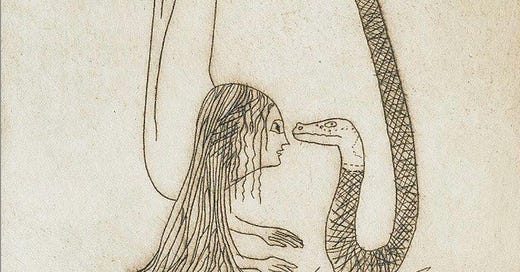‘It’s not enough to be nice in life. You’ve got to have nerve’ - Georgia O’Keeffe
A note on the prompts & monthly depth writing pod
At the end of this dispatch you’ll find depth writing prompts to channel your creativity & expand your sense of possibility. You can interpret the prompts any way you wish. You might want to do them now or when you have a quiet moment later on. You can do them on your own or with a friend. Or you can join the monthly depth writing pod on Monday October 14th 7pm - 8.15pm GMT to do the prompts with others in a friendly & supportive online space.
Free to paid subscribers - RSVP or use the zoom link in the footer to join the workshop
Not a paid subscriber but would like to join in? No problem - book your place here
Read on or listen to the audio to explore:
The wisdom of dreams.
The problem with people-pleasing at the expense of our needs.
Why we should be-friend our inner snake.
Artwork: Leonora Carrington
Like attacking like
Lately, a pair of collared doves have been appearing in my back yard. They plumply waddle across the stone flags, scratching at seeds, before fanning open their wings and flapping into the branches of the rowan on the other side of the alley as if they were as weightless as the pale feathers swirling to the ground in their wake.
Then one night as I was sleeping, the doves flew clean out of the rowan and into my dreams. One by one they plopped, coming to roost beneath the eaves of a barn - a whole flock, too many to count, improbably squishing their ample bodies into the dark, cramped space, amid a frantic rustle of feathers and loud, peeved cries. But instead of tucking beaks into breasts and going to sleep, the doves became increasingly agitated until the next thing I knew, dove was attacking dove, tearing at each other’s throats and turning the barn red with blood.
I woke, heart racing, unable to shift the doves’ cannibalistic orgy from my mind. More disturbing still was my dim awareness that these doves were carrier pigeons from some dark strata inside my own seams. But what was their message? Why were these birds of peace at each other’s throats? What inner self-sabotage might their bloody melee point to? Where was I unconsciously attacking myself?
The sliding doors between inner conflict & outer reality
On writing the dream down, beyond the sheer violence, what struck me was the great number of doves – far too many for the eaves to hold. Crammed inside the barn of my dream, the doves had turned in on themselves in a way that seemed to suggest that some peace-loving part of me had grown out of control and gone into overkill.
Like a lot of people, I learned to keep the peace as a child. In my case peacekeeping and its twin, people-pleasing, became a coping strategy to avoid the unpredictable, whimsical attacks of a dysregulated mother who, I now understand, was at war with herself.
As I reflected on my dream, I began to wonder where my inner peace-keeping corps was wielding too much power at the cost of the ‘many – far too many – aspects of life which should also have been experienced that lie in the lumber room among dusty memories’, as Carl Jung put it.
And, if so, what forgotten part of myself was now lying in a lumber room, covered in dust through an excess of keeping the peace?
The snake inside
Beneath those grey ashes of dusty memory, Jung also went on to say, ‘sometimes (there) are glowing coals.’ According to Jungian psychoanalysis, it is by paying attention to our dreams, no matter how nightmarish or terrifying, that we get to discover the bright burning embers of who we really are beneath the agreeable and nice masks we put on to fit in and be liked.
Meanwhile, in alchemy (the early form of chemistry which Jung viewed as a metaphor for the process of psychological transformation) the dove symbolises harmony and peace through its ability to bring opposites into union. In particular, the dove is associated with the stage of purgatio or purification. The dove is often visually depicted in alchemical texts as either descending into dark water or rising up from it, as in the story of Noah and the flood, in order to activate a healing process that brings together high and low, virtuous behaviour and dark primordial matter.
If my inner life was suffering from an excess of peace-keeping doves, I began to wonder whether the buried glowing coals somewhere inside me might have something to do with their opposite, too.
I have long been fascinated by the paradoxical riddle as told by Jesus to his disciples, in which he suggests they should be both ‘innocent as doves’ and ‘shrewd as snakes’ for all the ways this counter-intuitive wisdom elevates the cunning serpent of Genesis from vector of vice to pillar of virtue - echoing the process of union and cleansing in alchemy.
As I reflected on this, I began to wonder if the excess of doves in my dream might be pointing to where I had lost contact with my inner shrewd snake? And, if so, what might this snake look like? Who might she be?
In her 2024 book The Vital Spark, Jungian analyst and co-host of popular podcast This Jungian Life, Lisa Marchiano equates our innate shrewdness with the mythical figure of Lilith, the demonised first wife of Adam, who was cast from Eden for being too wild, too smart, too fiercely and unapologetically her own woman. Finding Lilith, Marchiano writes ‘will mean reconnecting with the repudiated qualities that she embodies. It will mean permitting ourselves to value autonomy, cunning and assertiveness.’
Marchiano goes on to suggest that - contrary to the loud social messaging in the culture saying the opposite - it’s by embodying and embracing these outlaw qualities that is precisely how we ‘care for and protect ourselves, respond to danger and find our unbridled playfulness and humour.’
To live more authentically, burn more brightly and avoid coming under attack from a flock of murderous doves, the memo, then, is to be more smart and less over-nice.
Finding Lilith
I remembered I’d met Lilith before in the dark hunched figure hanging upside down half-way up a wall in the British Museum like a scarab beetle or venomous spider which had recently crawled from a lake of black mud. The creation of artist Kiki Smith, this Lilith had dark blue eyes the colour of the compressed ice at the centre of glaciers. She stared down from the wall exuding a feral and intense quality that felt other than human. Whether she preferred to stay in the dark or whether her time had come to emerge, it was hard to say.
Then I recalled The Beatles documentary Get Back about the band’s final album and how I’d been mesmerised by the almost constant presence of Yoko Ono for all the ways she refused to blend in and play the ‘good’ wife. There she was draped in black beneath a veil of dark hair, neither nasty nor nice, but something altogether more slippery - standing her ground while stealing the show by stealth and turning it into what The New York Times called a ‘marathon piece of performance art’.
Finally, I thought of my terrifying English teacher, Miss Boucher - her flannel tweeds, her hairy mole and how she had no interest in being liked – only that we, her wayward charges, learn to love books as ferociously as she.
Would my Lilith have intense blue eyes like the dark woman scuttling sideways up the British Museum wall? Would she be slithery and slippery like Yoko and wear all black? Perhaps she would be like Miss Boucher and sport a whisker or two. Perhaps, in addition, she would also have a cat who, of course, would be black. Perhaps every once in a while this cat would pounce among the pigeons and send them all flying.
If you enjoyed this dispatch please do ‘heart’ & share so that others can find it – thanks so much!
Let’s discuss in the comments below
How and where do you see people pleasing showing up in the culture?
What are the individual and collective consequences of fitting in at the expense of our needs?
What does it mean to be as innocent as a dove and as shrewd as a snake?
Depth writing prompts
Reflect – when and where do you find yourself pleasing others at the expense of your own needs? How does this make you feel? Are there particular situations where you find yourself doing this more than others?
Think of someone real or fictional, living or dead known for being shrewd, disagreeable and cunning. Write instructions to yourself in their voice. What guidance and wisdom do they have to offer? Notice what it feels like to embody this voice.
Recall a situation where you avoided conflict. Re-write the scene from the perspective of your inner shrewd snake.
Join the monthly Depth-Writing Pod on Monday October 14th, 7pm-8.15pm GMT
Press pause on the busyness of life, connect with others and, most importantly, have time just for yourself to write in response to this month’s prompts. You are don’t need any writing experience to join and there will be no pressure to read anything out. All you need is a spirit of adventure and curiosity!
Paid subscribers - RSVP to this email or join with the zoom link in the footer below.
N.B. Although depth-writing is therapeutic, it’s not therapy, so let the words lead but only as far as want to go.
By joining this workshop, you are agreeing to practice CARE - confidentiality, attention, respect & empathy - with others.
Got a question or want to say hi? I love hearing from readers so if you want to get in touch, just reply to this email or send me a message.














Share this post